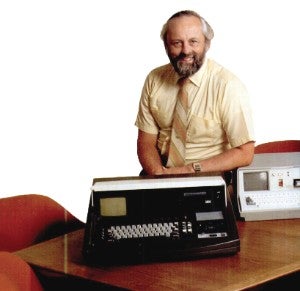LENS Innovate
The Origin of PCs
The Radical Experiment that Helped Redefine Computing

Paul Friedl was hailed as the inventor of the world's first personal computer. He turned a revolutionary idea into the device he called SCAMP.
In January 1973, IBM engineer Paul Friedl, PhD (CIT '55; GRS '57, '60, chemical engineering), brought his managers a bold idea: create a portable computer for personal use—a revolutionary concept in an era when computers were bulky, shared and stationary. Friedl showed his bosses sketches for a device he called SCAMP—Special Computer APL [a programming language] Machine Portable. They gave him six months to turn it into reality.
The Palo Alto, California, engineer borrowed 10 of the best IBM programmers and engineers he could find to make the prototype, which he delivered on time. Friedl, though, fretted about how to present it to his superiors, eventually deciding to just sit them down and have them operate it. "Gee, that thing almost does what a computer does!" one of the executives exclaimed to Friedl, according to a 1983 PC World article; he then had to convince the group that this suitcase-shaped device with a pop-up screen was, indeed, a computer. The design would serve as inspiration for the development of IBM's mass-market personal computer line.
In 1988, the SCAMP prototype was exhibited at the National Museum of American History, with curator J.B. Eklund—in a presentation that Friedl lmed and later uploaded to YouTube—deeming it the first microcomputer, marveling at its six-month timeline and calling it "a towering achievement." In 1994, the Silicon Valley Engineering Council inducted Friedl into its Hall of Fame, calling him the "chief architect and inventor of the world's first personal computer."
Friedl, who died in March 2016, maintained a forward vision—one that proved prescient: In a 1983 PC Magazine article, he predicted that SCAMP's descendants would one day link together to form new systems "designed to plan, advise, teach, play and communicate with users everywhere."





